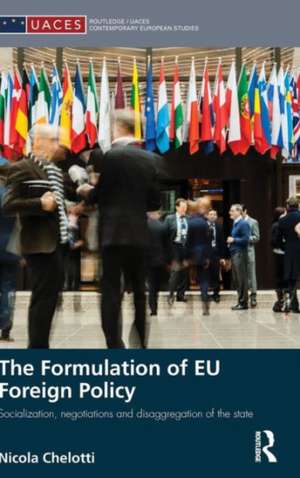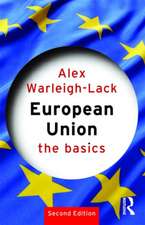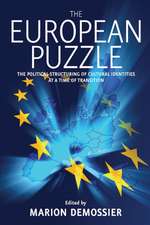The Formulation of EU Foreign Policy: Socialization, negotiations and disaggregation of the state: Routledge/UACES Contemporary European Studies
Autor Nicola Chelottien Limba Engleză Hardback – 4 feb 2016
Although the importance of these committees and their participants has been increasingly recognised, we still know relatively little about them. Using an original database of 138 questionnaires and 37 interviews, this book addresses this lack of knowledge, studying what these committees do and how they negotiate and resolve issues. It explores three key areas:
- the formulation of the national position;
- the identity of CFSP/CSDP policy-makers;
- negotiation practices and outputs.
This book will be of key interest to scholars and students of EU foreign and defence policy, external relations of the EU, European integration and politics, diplomacy and more broadly international relations.
| Toate formatele și edițiile | Preț | Express |
|---|---|---|
| Paperback (1) | 449.41 lei 6-8 săpt. | |
| Taylor & Francis – 23 oct 2017 | 449.41 lei 6-8 săpt. | |
| Hardback (1) | 1055.51 lei 6-8 săpt. | |
| Taylor & Francis – 4 feb 2016 | 1055.51 lei 6-8 săpt. |
Din seria Routledge/UACES Contemporary European Studies
-
 Preț: 312.34 lei
Preț: 312.34 lei -
 Preț: 348.15 lei
Preț: 348.15 lei -
 Preț: 310.84 lei
Preț: 310.84 lei - 9%
 Preț: 1005.57 lei
Preț: 1005.57 lei -
 Preț: 393.09 lei
Preț: 393.09 lei -
 Preț: 325.38 lei
Preț: 325.38 lei -
 Preț: 287.68 lei
Preț: 287.68 lei - 18%
 Preț: 945.80 lei
Preț: 945.80 lei -
 Preț: 275.30 lei
Preț: 275.30 lei -
 Preț: 284.52 lei
Preț: 284.52 lei -
 Preț: 464.54 lei
Preț: 464.54 lei -
 Preț: 464.54 lei
Preț: 464.54 lei - 18%
 Preț: 1057.75 lei
Preț: 1057.75 lei - 18%
 Preț: 703.79 lei
Preț: 703.79 lei - 34%
 Preț: 822.34 lei
Preț: 822.34 lei - 15%
 Preț: 66.82 lei
Preț: 66.82 lei -
 Preț: 413.33 lei
Preț: 413.33 lei -
 Preț: 284.52 lei
Preț: 284.52 lei - 18%
 Preț: 1000.27 lei
Preț: 1000.27 lei - 18%
 Preț: 699.96 lei
Preț: 699.96 lei -
 Preț: 391.57 lei
Preț: 391.57 lei -
 Preț: 460.69 lei
Preț: 460.69 lei - 18%
 Preț: 1065.06 lei
Preț: 1065.06 lei -
 Preț: 464.54 lei
Preț: 464.54 lei -
 Preț: 315.29 lei
Preț: 315.29 lei - 18%
 Preț: 1054.71 lei
Preț: 1054.71 lei -
 Preț: 483.49 lei
Preț: 483.49 lei -
 Preț: 411.64 lei
Preț: 411.64 lei - 12%
 Preț: 312.43 lei
Preț: 312.43 lei - 26%
 Preț: 850.59 lei
Preț: 850.59 lei - 18%
 Preț: 1060.11 lei
Preț: 1060.11 lei - 15%
 Preț: 701.45 lei
Preț: 701.45 lei -
 Preț: 440.21 lei
Preț: 440.21 lei -
 Preț: 386.51 lei
Preț: 386.51 lei -
 Preț: 462.60 lei
Preț: 462.60 lei
Preț: 1055.51 lei
Preț vechi: 1287.22 lei
-18% Nou
Puncte Express: 1583
Preț estimativ în valută:
201.97€ • 210.87$ • 167.16£
201.97€ • 210.87$ • 167.16£
Carte tipărită la comandă
Livrare economică 04-18 aprilie
Preluare comenzi: 021 569.72.76
Specificații
ISBN-13: 9781138830578
ISBN-10: 1138830577
Pagini: 216
Ilustrații: 5 black & white illustrations, 31 black & white tables, 5 black & white line drawings
Dimensiuni: 156 x 234 x 18 mm
Greutate: 0.48 kg
Ediția:1
Editura: Taylor & Francis
Colecția Routledge
Seria Routledge/UACES Contemporary European Studies
Locul publicării:Oxford, United Kingdom
ISBN-10: 1138830577
Pagini: 216
Ilustrații: 5 black & white illustrations, 31 black & white tables, 5 black & white line drawings
Dimensiuni: 156 x 234 x 18 mm
Greutate: 0.48 kg
Ediția:1
Editura: Taylor & Francis
Colecția Routledge
Seria Routledge/UACES Contemporary European Studies
Locul publicării:Oxford, United Kingdom
Public țintă
PostgraduateCuprins
Introduction 1 Actors and decision-making processes of EU foreign and defence policy 2 Theories and the CFSP/CSDP decision-making process 3 Profiles, Working Habits and Experience of EU Diplomats 4 Preparing the national position: the capital-Brussels nexus 5 Identities: a diplomatic republic of Europe? 6 Decision-making styles and practices Conclusion
Notă biografică
Nicola Chelotti is LSE Fellow in the Department of International Relations at the London School of Economics and Political Science, UK.
Recenzii
'EU foreign policy has always been a secretive, elite-driven phenomenon, and many scholars have suggested that these officials have their own unique working methods to build consensus in the face of competing national perspectives. Yet until now we have lacked a comprehensive study of these processes, their relationship to national positions, and their impact on the international role of the EU. The Formulation of EU Foreign Policy admirably fills that gap, and is a very welcome addition to the literature.' - Prof. M.E. Smith, University of Aberdeen, UK.
Descriere
EU foreign and defence policy is largely formulated in the working parties and committees of the Council of the EU and the vast majority of decisions in this field are made by the national diplomats working in the around 35 groups of the CFSP/CSDP.
Although the importance of these committees and their participants has been increasingly recognised, we still know relatively little about them. Using an original database of 138 questionnaires and 37 interviews, this book addresses this lack of knowledge, studying what these committees do and how they negotiate and resolve issues. It explores three key areas:
- the formulation of the national position;
- the identity of CFSP/CSDP policy-makers;
- negotiation practices and outputs.


















